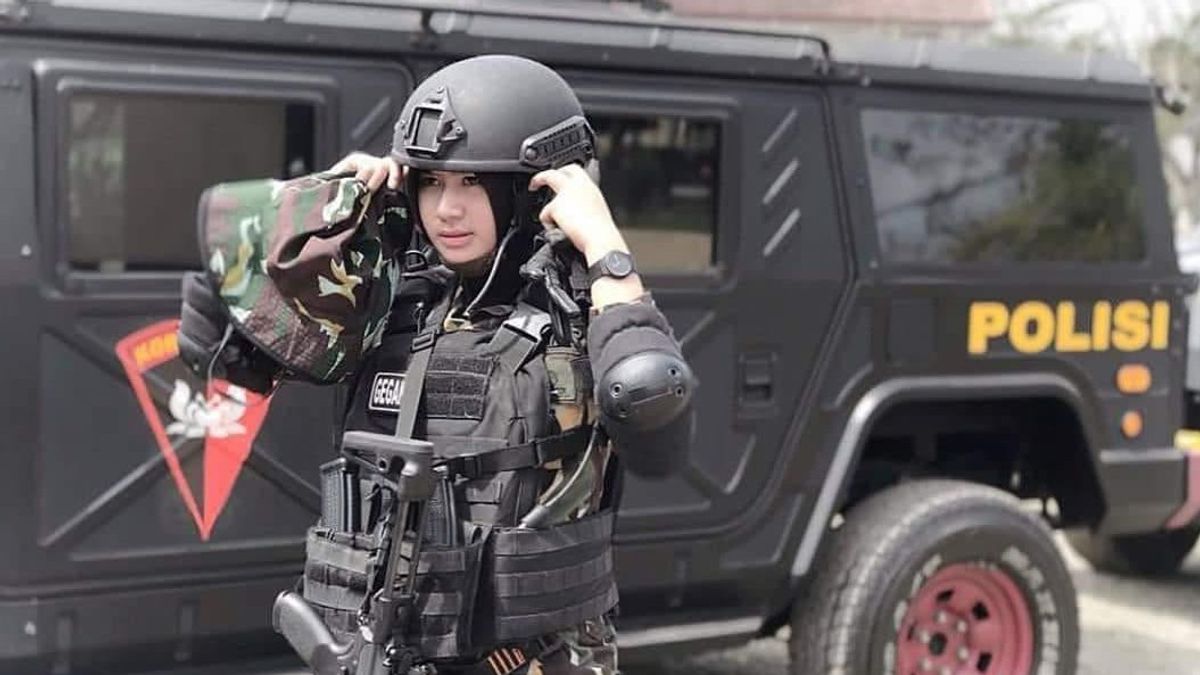JAKARTA - From the time of General Raden Said Soekanto Tjokrodiatmodjo as the first National Police Chief (Kapolri) until he changed 24 times, there was no female police officer (Polwan) who occupied that position. Let alone being the Chief of Police who needs to have the rank of four stars, there are only three Polwan with one star at the moment. So is it possible for a policewoman to be able to hold the highest position in the National Police?
Policewomen have existed since the early days of Indonesian independence. To be precise today is September 1st more than half a century ago or in 1948.
At that time Polwan first appeared in Bukittinggi, West Sumatra. At that time 12 Polwan candidates followed the selection. However, only six people managed to escape according to the official National Police website. They are Nelly Pauna, Mariana Saanin, Rosnalia Taher, Djasmaniar, and Rosmalina.
The six people were admitted for the first time in the recruitment of Police Cadre Candidates for officer level held in Bukitinggi. The woman is a graduate of the MULO school (Meer Uitgebreid Lager Onderwijs), who later carried out Police education in Bukitinggi.
As part of the Indonesian Police Corps, Polwan have the same position or equal position as male police officers. There is no real difference. Moreover, in the 21st century the role of policewomen in the body of the police is increasingly needed in line with the increasing number of crimes related to gender, such as sexual harassment, domestic violence (KDRT) and other cases that are mostly experienced by women.
FractionNational Police Chief General Idham Azis said that currently policewomen have filled a number of strategic positions, both at the Police Headquarters, Polda, Polres and Polsek. However, it seems that to fill the highest position as the Chief of Police is still too far away.
Seeing that the number of Polri members at this time is still relatively small, which is less than six percent of the total number of Polri members, which reached 470,391 last year. According to Polri data recorded by Antara, there were 24,506 Polwan personnel consisting of three high-ranking officers, 1,567 mid-level officers, 355 first officers and 19,581 non-commissioned officers.
Never mind that to occupy the position as Chief of Police, there has only been one Polwan since the establishment of the Polri institution. He is Brigadier General Pol Rumiah Kartoredjo.
Quoting seconds, Rumiah was appointed as Head of Banten Regional Police by the National Police Chief, General Sutanto, replacing Brigadier General Timur Pradopo on January 23, 2008. This was a historic day for the Police Corps for the first time in Polri's history that a policewoman was assigned to the top leadership of the police at the provincial level. Rumiah, who a few days after taking office finally carried the rank of one star on his shoulders.
In the history of the National Police, the highest rank of Policewomen is stuck at two stars. The rank was first won by Inspector General Pol Basariah Panjaitan. She also made history as the first female candidate for leadership in the KPK. But unfortunately he did not pass the psychological test.
Then the second policewoman who received the two-star title, Sri Handayani, is now retired. Meanwhile, the Polwan with the highest rank was Ida Oetari, Juansih and Apriastini. All three are still one star.
The causeAccording to the Commissioner for the National Police Commission (Kompolnas) Poengky Indarti, the difficulty for Polwan to pursue a position as the leader of the National Police cannot be separated from the history of Polwan's development itself. According to him, it all started when Polri was integrated into ABRI in the 1950s.
"When combined with ABRI and TNI, it is subject to ABRI rules. At that time, ABRI did not recruit women to become soldiers," said Poengky when contacted by VOI.
So that at that time the development of Polwan stagnated. Until around 75, the women's class at the police education school in Ciputat was reopened. Then in the 80s there was also the Polwan Pusdik.
"That's the non-commissioned officer, the cadets or the Police Academy were only opened in the 2000s. So the pursuit is very far. Since that policy, Polwan has stagnated," said Poengky.
According to Poengky, at that time both the police and the soldiers were only considered men. "So it is understandable when later there are no policewomen whose position can reach a three-star general," he said.
Nevertheless, Poengky said that the constitution in no way prohibits Polwan members from becoming Chief of Police. According to him, it is open to anyone provided that it meets the requirements stipulated by law.
Policewomen may, as long as they meet the requirements set forth in Article 11 of Law no. 2 of 2002. But then, there was Wanjakti, there was also Kompolnas. If we propose to the President it is based on track records, achievements. But the name can be male or female, "explained Poengky.
Poengky did not deny that to become a National Police Chief, apart from having a three-star rank, he also had to have extraordinary achievements. "Maybe you have had an extraordinary promotion. It can't be if the other average achievements are also like that, then we can nominate it for the rich or not."
However, in the future, it is possible for a policewoman to become the National Police Chief, said Poengky. "Policewomen who can reach three stars can become the police chief in the future," he said.
The English, Chinese, Japanese, Arabic, and French versions are automatically generated by the AI. So there may still be inaccuracies in translating, please always see Indonesian as our main language. (system supported by DigitalSiber.id)











